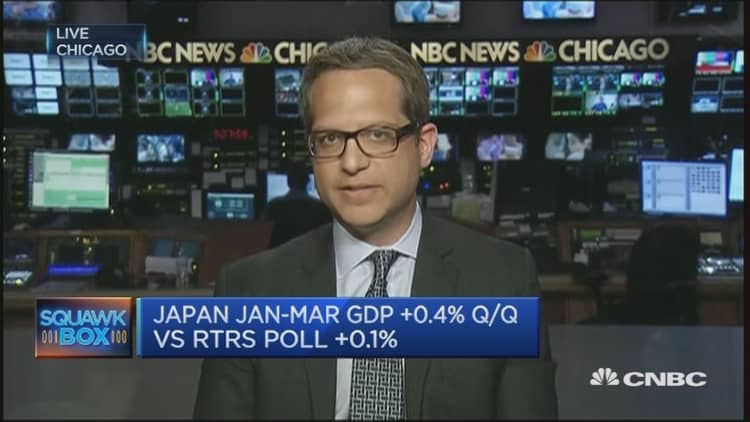

The world's third-largest economy surprised markets on Wednesday by reporting its fastest pace of annualized quarterly growth in a year.
Real gross domestic product (GDP) for the January-March period expanded an annualized 1.7 percent against expectations in a Reuters poll for a 0.2 percent rise. On a quarterly basis, GDP grew 0.4 percent against a poll forecast of a 0.1 percent quarterly gain.
Eisuke Sakakibara, Japan's former vice finance minister, now a professor at Aoyama Gakuin University, said the first-quarter report card confirmed his bullish view.
"I was expecting a strong read because the economy is in recovery," he told CNBC's "Squawk Box." This year, it's quite likely growth will be around 1 percent so the recovery is going on fairly smoothly."
Wednesday's report marked a significant recovery from the 1.7 percent revised annualized contraction in the October-December quarter, quashing fears that the economy would enter a technical recession, usually defined as two straight quarters of negative growth.
Much of the strength could be attributed to the leap-year effect, noted Kohei Iwahara, economist at Natixis Japan Securities.
"It may sound like a trivial issue but when you have one more day in February, that's 1.1 percent more days in the quarter so people are spending and eating more."
The domestic demand contribution to GDP inched up 0.2 percentage points thanks to higher spending on televisions and recreation, as well as food and beverage, noted a government official, Reuters reported.
But while personal spending was on the mend, consumer confidence remained soft overall and recent wage increases were disappointing, Iwahara said. The government's consumer confidence index fell 0.9 points in April on-month.
Private consumption accounts for 60 percent of Japan's economy and is crucial to Prime Minister Shinzo Abe's quest to end a near 20-year deflationary history. The Bank of Japan's (BOJ) decision to take rates below zero was aimed at driving loan demand for households and corporates, a move that the central bank hoped would incentivize consumer spending.
The weak spot
Capital expenditure (capex) for the January-March period,released simultaneously with GDP, revealed a gloomier economic outlook.
Capex declined 1.4 percent on-year, the fastest pace of decline in nearly a year and much worse than estimates. Higher capital spending is critical to "Abenomics", the Prime Minister's economic platform that has focused on getting companies to spend more on wages and investments.
Iwahara said the result wasn't surprising given the country's weak trade performance, with March marking the sixth straight month of export declines.
"Japan is focusing on exporting capital goods to Asian economies and because global business investment is subdued, we can't expect an increase in exports. Given this background and poor corporate profitability,I'm not surprised business investment is on the weak side."
The yen's sharp rally against the greenback in recent months—DBS estimates the yen is more than 9 percent higher since the BOJ introduced negative rates on January 29 — has weighed on the balance sheet of Japan Inc. A strong currency dents repatriated earnings for export-centric companies.
It was true that companies had a lot of cash on their hands, but they may start to invest in the months to come on expectations of strong economic recovery, Sakakibara said.
Widely known as Mr. Yen for intervening in the currency during his time as vice finance minister, Sakakibara expects the currency to continue spiking. "There will be a slow appreciation towards the 100 level in the next six months or a year," he said.
What now for policy?
Following the GDP data, economy minister Nobuteru Ishihara said the government would maintain a flexible policy stance amid developments in China and global market volatility.
Abe is widely expected to announce new fiscal stimulus during the G7 Summit this month as part of his "Abenomics 2.0" program.
"The measures are expected to be a mix of stimulus (i.e. shopping vouchers to stimulate household consumption, public works projects) and de-regulation," HSBC economist Izumi Devalier explained in a recent report.
Last year, Abe updated his signature economic platform, a move widely read as a sign of recognition that previous policies weren't working. The three arrows of Abenomics 1.0—high public spending, aggressive monetary easing and structural reforms—were replaced under the 2.0 plan with a focus on a strong economy, improved social security and better support for child care.
On the monetary front, strategists still widely expect more easing from the BOJ, with DBS forecasting action at the central bank's June or July meeting.
"I was talking with Governor Kuroda yesterday, and he's quite confident that negative rates will eventually seep through markets and be reflected in increasing investment. I think he will continue to take fairly aggressive easing, perhaps towards the end of the year," said Sakakibara.


